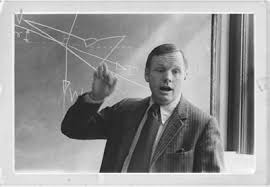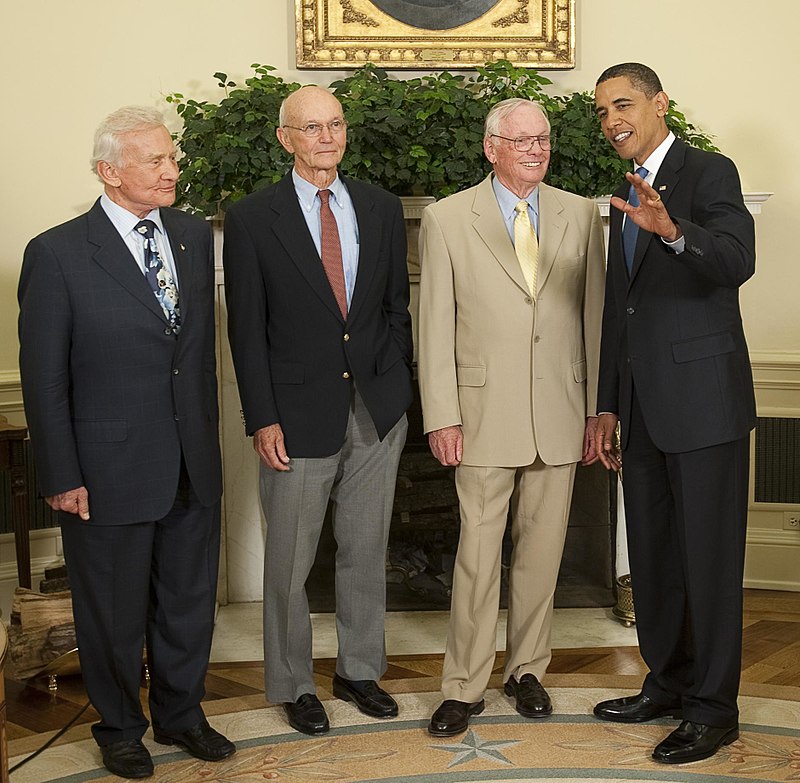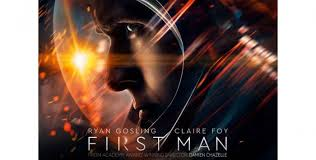Neil Armstrong and First Man – A Personal Review
By Chris M. Barkley: Meeting Neil Armstrong was one of the most memorable moments in my life.

From the fall of 1974 through the spring of 1975, I was employed as a server at the University of Cincinnati Faculty Club. It was my freshman year there and I enrolled thinking I was going to major in broadcasting. I needed a part time job to supplement my comic book habit so I looked for something immediately after classes started. Since my previous job had been as a dishwasher in a local restaurant, when the club advertised for a server, I figured (wrongly, as it turned out) that this was probably be a promotion.
Since my schedule had a huge gap between 11 a.m. and 2 p.m., I drew duty tending to the buffet for the professors in the basement of the club.
One fine spring afternoon, while tending a huge pot of turtle soup, I saw a lone figure descending the stairs and walking towards me. He was slight in build and surprising shorter than me. As he approached he was instantly recognizable to me, the most famous and celebrated man on planet Earth at that time.
I had heard that he was teaching a course on aeronautical engineering on campus (and did so between 1971-1979) but I had not seen him before now. Thinking quickly, I had read that he was loath to have people geeking out on him so I decided to play it totally cool and treat him like any other faculty member.
Professor Armstong walked up and politely requested a bowl of soup. He looked around at the sparsely populated dining area as I ladled soup into his bowl.
“Not much going on around here today, eh?” he said with a slight grin.
“No, not much,” I replied. “Is there anything else I can get for you today?”
“No, thank you.”
“You’re welcome. Have a nice day.”
“You, too.”
And with that he proceeded to help himself to the salad bar and sat alone in a corner table for the rest of the hour.
Neil Armstrong. Polite. Reserved. Courteous. Living as quietly as possible in shadows, ever so wary of the glaring limelight of fame.
I never saw him again.
But we are still connected, albeit in a sad way.
Neil Armstrong died on my birthday in 2012.
Nearly everyone who was alive on July 20, 1969, should know this date, what happened that day and where it happened.
When Michael Collins was interviewed by Terry Gross on NPR’s Fresh Air in 1988, he described the Apollo 11 mission as a delicate daisy chain of events; if one or more things went terribly wrong, things could have quickly taken a lethally tragic turn.
On that Sunday, at 4:00 p.m. Eastern Daylight Time, I was in my parent’s living room, glued to the television for a good portion of the day, watching Walter Cronkite and the CBS news team’s coverage of the Apollo 11.
An hour and sixteen minutes earlier, the lunar excursion module carrying Armstrong and Buzz Aldrin separated from the command module piloted by Michael Collins. At 4:04 pm, the LEM was 50,000 feet from the surface. A minute later, the main engine fired up for a powered descent.
Although I was an incredible space geek at the age of twelve, I had no idea what the astronauts and Houston were talking about most of the time. I relied on the studio commentators for that information. So when things went south and everyone went silent in light of the historic occasion, all of the trouble that occurred went right over my head.
As the LEM descended towards the surface, the radar system completely failed. It was quickly rebooted by opening and closing the circuit breaker on the LEM. A glitch in the guidance computer handling radar data was triggered four times along with another alarm, but ground controllers easily provided quick fixes.
But the biggest problems were two fold; the LEM’s automated guidance system had overshot the original landing area by approximately five miles and was heading towards a stadium sized crater and a field of car sized boulders. And they were running out of fuel. Reacting quickly, Armstrong took over manually and steered the LEM over the crater to a clearing beyond it.
I was obvious to all of this; very few in the audience watching had any idea what was happening beyond hearing “alarm” several times over the live audio. The landing itself was rendered by an elaborate NASA animation that played over all of the voice communications.
Armstrong finally found a relatively level surface with less than 30 seconds of fuel left. Aldrin called out the altitude until he spoke the first words heard broadcast from the surface of the Moon:
102:45:40 Adrin: Contact Light.
l102:45:43 Armstrong (onboard): Shutdown
102:45:44 Aldrin: Okay. Engine Stop.
102:45:45 Aldrin: ACA out of Detent.
102:45:46 Armstrong: Out of Detent. Auto.
102:45:47 Aldrin: Mode Control, both Auto. Descent Engine Command Override, Off. Engine Arm, Off. 413 is in.
102:45:57 Duke: (Reporting that Houston has received telemetry confirming engine shutdown and that they have heard Buzz’s transmission regarding address 413) We copy you down, Eagle.
102:45:58 Armstrong (onboard): Engine arm is off. (Pause) (Now on voice-activated comm) Houston, Tranquility Base here. The Eagle has landed.
102:46:06 Duke: (Responding to Neil’s transmission but momentarily tongue-tied) Roger, Twan…(correcting himself) Tranquility. We copy you on the ground. You got a bunch of guys about to turn blue. We’re breathing again. Thanks a lot.
102:46:16 Aldrin: Thank you.
The image I remember most vividly that afternoon was that of Walter Cronkite right after the confirmation of the Eagle’s landing Profusely sweating, slightly flustered, his kindly face looked relieved and happy at the same time. He knew exactly what had just happened and that a disaster had been barely averted. And his assertion of giddiness mirrored what everyone else watching was feeling; we were on THE MOON!

At 10:55 p.m., my mother, Alice Elder Barkley and I were watching Neil Armstrong climb down the LEM ladder, live on my grandmother’s vintage 1950’s hand-me-down Philco black and white television set. Everyone else in the house was asleep.
As Armstrong stepped off the vehicle and spoke those words that we know so well, we said nothing. Our two generations had just witnessed one of the most historic events in our brief existence on this planet. What could we say? It was quite profound.
After a while my mother went to bed. I stayed up and heard President Nixon’s call and the rest of the lunar excursion. Afterwards, I stepped out into our backyard and marveled at the spectacle of seeing the moon overhead that night.
The human race was up there. And since then twelve others have walked and explored there. And some day in the near future, we will return.

Originally, I was going to write this column in conjunction with the October 2018 release of First Man, a film based on the 2005 autobiography of Neil Armstrong by James Hansen. While I was very enthusiastic about it, I found myself strangely blocked. Only as the 50th anniversary of the Moon Landing approached did I slowly realize that I was just waiting for the right time to express my feelings about it and my connection to Neil Armstrong.
My partner Juli and I went to the opening night screening and I was disappointed to see that it was sparsely attended. Of the twenty or so people there, most were in the 50’s and 60’s like us. After it was all over, most of us lingered for the credits and magnificent closing score by Justin Hurwitz.
First Man was released with great fanfare among film critics and is generally regarded as a great cinematic triumph but a box off failure, only grossing an estimated $107million on a budget of $50 million. I think if the Universal, Dreamworks and Amblin, the producers of the film, should have rolled the dice and released First Man much closer to the actual date, it might have done much better at the box office. Then again, considering that it might have been competing against Spider-Man, Far from Home, The Lion King and a host of other summer movies might have been a contributing faction.

Director Damien Chazelle and screenwriter Josh Singer had actually started working on an adaption of First Man before Chazelle had begun work on his multiple Academy Award winning breakout film, La La Land.
First Man covers the life of Armstrong (Ryan Gosling) and his then wife Joan (Claire Foy) and two sons Rick and Mark, his struggles as a civilian test pilot, his application and selection as a NASA astronaut to his Gemini and Apollo missions.
Nothing was handed to him on a silver platter; he suffered through the cancerous brain tumor that claimed his young daughter Karen’s life, problems connecting emotionally with his wife and children and the sudden and incredibly tragic deaths of his fellow test pilots and astronauts.
Although certain liberties were taken with the chronology, Chazelle and Singer managed to accurately convey the essence of Neil Armstong’s life realistically, with all of his flaws and emotional struggles. Gosling portrays him brilliantly; a somewhat doting dad one moment and a repressed, withdrawn and almost too self-centered engineer in many others.
Claire Foy matches him scene for scene as his wife Janet, a woman whose love and compassion for her family runs deep and is unafraid to confront Neil or any other authority when something threatens it.
The screenplay makes it clear that while Armstrong is driven and ambitious, he’s very wary of seeking out fame and undue influence that comes with it. This is illustrated in a very telling scene when Deke Slayton (Kyle Chandler), the chief of the Astronaut’s Office informs him that he has been selected to be the commander of Apollo 11, he stoically accepts the assignment but as he looks in the restroom mirror afterwards, you can almost feel the range of emotions raging inside him as he contemplates what he just agreed to do.
First Man also joins an elite group of films (Destination: Moon, Marooned, 2001: A Space Odyssey and Apollo 13) that shows exemplemary care in the depiction of space flight. The visual effects, designed and executed by Paul Lambert, Ian Hunter, Tristan Myles, J.D. Scwalm, deservedly won an Academy Award for Best Visual Effects. Not only did they recreate a realistic and harrowing descent of the Eagle to the Moon, they also made space flight personal by mostly using Armstrong’s point of view during the flight sequences and engages the audience in an intimate way.
Twenty-seven prominent film critics listed First Man in their Top Ten lists of 2018. I am very hopeful that its reputation will become even more burnished as time passes and will lead the more curious to James Hansen’s book and other adventures in science.
So tonight, if you can, look up and gaze at the moon. Remember those who had the training, skill, luck and privilege of orbiting and exploring it over a half a century ago. And never forget the supporting cast of 400,000 people who made it all possible.
Also of interest:
- “One giant leap for mankind,’ 50 years on” — Reuters
- “Author James Hansen On ‘First Man’ Neil Armstrong, As Apollo 11 Hits The Big Screen” – WBUR On Point
Discover more from File 770
Subscribe to get the latest posts to your email.

I, too, had heard how he didn’t like to be geeked on and I had always planned out that I would play it cool if and when I ever did happen to run into him around town. As it happens, I never did, but I used that same strategy with other celebs who came in the various bookstores I worked at over the years and it seemed to work so I like to think it would have worked with him, too.
Buzz Aldrin spoke the first words from the surface of the Moon: “Contact light.”
Ten years ago MIT did an Apollo symposium and I get to meet Chris Kraft, Harrison Schmitt, and to shake hands with both Buzz Aldrin and Neil Armstrong. I didn’t gush… just politely said thank you for all you’ve done… and I called Buzz Colonel Aldrin and Neil Professor Armstrong.
A while later I was driving home through heavy Cambridge traffic, and I saw Neil Armstrong walking along the sidewalk with his MIT escort, and scores of people walked by, none seemingly noticing who they were passing!
Pingback: AMAZING NEWS FROM FANDOM: 7-21-19 - Amazing Stories
Pingback: Great Deeds | File 770